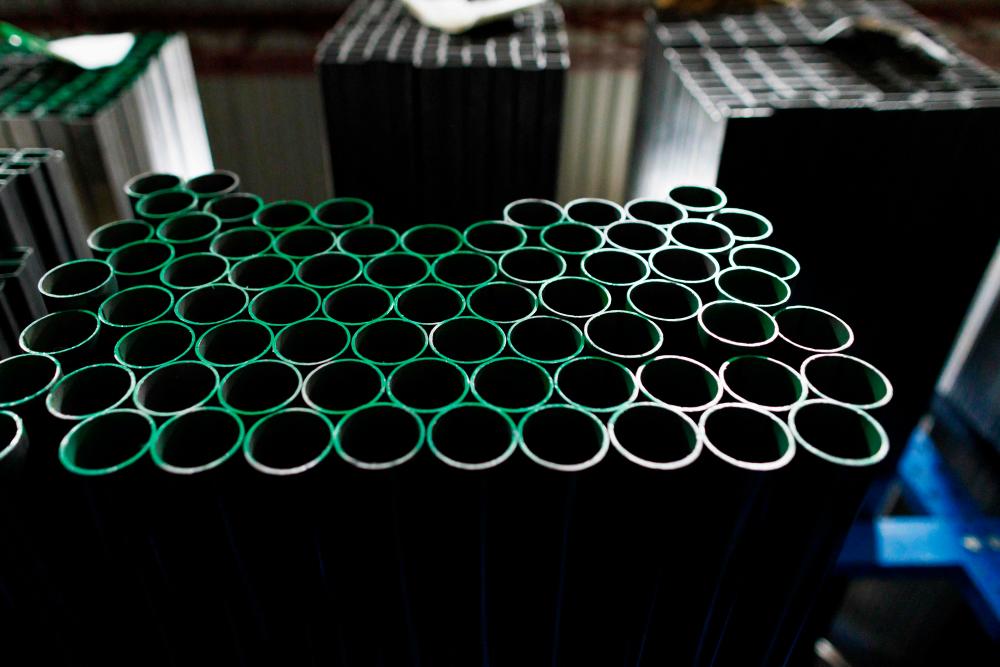WASHINGTON: Mexico, Canada and the European Union on Tuesday condemned U.S. President Donald Trump's decision to impose tariffs on all steel and aluminum imports next month, a move that has fanned fears of a trade war as business and political leaders braced for yet more trade duty announcements from the new administration.
Businesses around the United States also warned of fallout from the tariffs, with many manufacturing-heavy companies finding it difficult to plan next steps or determine if Trump will follow through. The tariff hike would reverberate across the supply chain, affecting all businesses that rely on the materials, they said.
Trump signed proclamations late on Monday raising the U.S. tariff rate on aluminum to 25% from his previous 10% rate and eliminating country exceptions and quota deals as well as hundreds of thousands of product-specific tariff exclusions for both metals.
The measures, due to take effect on March 12, will apply to millions of tons of steel and aluminum imports from Canada, Brazil, Mexico, South Korea and other countries that had been entering the U.S. duty free under the carve-outs.
Mexican Economy Minister Marcelo Ebrard called the tariff decision “not justified” and “unfair.” He did not say if Mexico planned reciprocal tariffs on steel or aluminum it imports from the United States.
Canadian Prime Minister Justin Trudeau said the tariffs were “unacceptable.” Canada's response, if needed, would be firm and clear, he said at an artificial intelligence summit in Paris.
European Commission President Ursula von der Leyen joined the condemnation, saying the 27-nation bloc would take “firm and proportionate countermeasures.” U.S. Vice President JD Vance said he would discuss trade and economic issues with Von der Leyen at an AI summit in Paris on Tuesday.
The move will simplify tariffs on the metals, Trump told reporters. “It’s 25% without exceptions or exemptions,“ he said. “That’s all countries, no matter where it comes from, all countries.”
Trump said on Monday he would announce reciprocal tariffs over the next two days on all countries that impose duties on U.S. goods, and said he was also looking at tariffs on cars, semiconductors and pharmaceuticals.
Asked about threats of retaliation by other countries against his new tariffs, Trump said, “I don’t mind.”
No updated guidance on timing for those had been provided by the White House by Tuesday afternoon.
READY TO RETALIATE
European Commission head von der Leyen said she deeply regretted the U.S. decision, adding that tariffs were taxes that were bad for business and worse for consumers. EU steel exports to the U.S. have averaged about 3 billion euros ($3.1 billion) a year over the past decade.
“Unjustified tariffs on the EU will not go unanswered - they will trigger firm and proportionate countermeasures,“ she said in a statement.
One option for the EU would be to reactivate the tariffs it imposed in 2018 during Trump's first term, which were suspended under an agreement with his predecessor, President Joe Biden.
The EU tariffs on U.S. products such as bourbon, motorcycles and orange juice are currently suspended until the end of March.
The American Chamber of Commerce to the EU (AmCham EU), representing U.S. companies active in Europe, also criticised the move as harmful to jobs, prosperity and security on both sides of the Atlantic.
“The damage will extend beyond just the steel and aluminum sectors, impacting all businesses that rely on these materials throughout the supply chain,“ it said in a statement.
COST AND CHAOS
Executives across industries reliant on steel and aluminum imports were
scrambling
to offset the cost of Trump's move after previous tariff threats from the White House that were later scrapped.
Companies ranging from Coca-Cola and Ford to smaller aluminum, aerospace and appliance firms expect to be affected by Trump’s moves, which Ford CEO Jim Farley said have so far added “a lot of cost and a lot of chaos” to American business.
The Coalition of American Metal Manufacturers and Users (CAMMU) said failure to include a workable exclusion process would hurt U.S. manufacturers, and especially small- and medium-sized businesses that were left paying significantly more for inputs to their production.
“Foreign customers are shifting their supply chains away from U.S. producers. Once removed, especially for smaller, family-owned businesses, it is difficult to regain that lost business,“ the group said.
It said the threat of retaliatory tariffs from key trading partners further threatened U.S. exports and manufacturing jobs, stalling expansion plans and teeing up difficult choices on investments, retention and long-term growth.
Steel imports accounted for about 23% of American steel consumption in 2023, according to American Iron and Steel Institute data, with Canada, Brazil and Mexico the largest suppliers.
Canada accounted for nearly 80% of U.S. primary aluminum imports in 2024.
Trump also will impose a new North American standard requiring steel imports to be “melted and poured” and aluminum to be “smelted and cast” within the region to curb U.S. imports of minimally processed Chinese and Russian metals that circumvent other tariffs.
While China exports only tiny volumes of steel to the U.S., it is responsible for much of the world's excess steel capacity, according to the U.S. It says subsidised production in China forces other countries to export more and leads to trans-shipment of Chinese steel through other countries into the U.S. to avoid tariffs and other trade restrictions.









